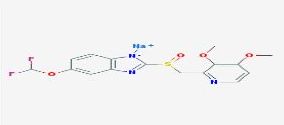Pantoprazole Sodium Is The Sodium Salt Of A Substituted Benzimidazole. The Treatment Of Duodenal & Gastric Ulcers, The Prevention Of Gastro-duodenal Damage In Patients Taking Nsaids, And As Adjunctive Therapy With Antibiotics For The Eradication Of Helicobacter Pylori. Intravenous Pantoprazole Is Indicated For The Short Term Treatment Of Gerd, As An Alternative For Those Patients Who Are Unable To Take The Oral Formulation. Other Potential Uses For Intravenous Pantoprazole Include Prevention Of Aspiration Pneumonia In Patients Undergoing Surgery, Prevention Of Stress Ulcers In Intensive Care Patients, Treatment Of Pyloric Channel Ulcers, And Treatment Of Zollinger-ellison Syndrome, It May Also Show Benefit For The Maintenance Treatment Of Erosive Esophagitis It Crosses The Parietal Cell Membrane & Enters The Acidic Parietal Cell Canaliculus Where It Becomes Protonated, Producing The Active Metabolite Sulfenamide, Which Forms An Irreversible Covalent Bond With Two Sites Of The H+/k+-atpase Enzyme Located On Gastric Parietal Cell, Thereby Inhibiting Both Basal And Stimulated Gastric Acid Production. It Relieves Symptoms Such As Heartburn, Difficulty In Swallowing And Persistent Cough. Pantoprazole Belongs To A Class Of Drugs Known As Proton Pump Inhibitors (Ppis)
Details
Molecular Structure
